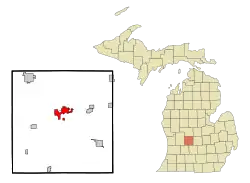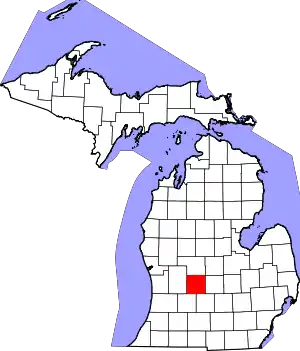Ionia, Michigan
Ionia is the largest city in, and the county seat of, Ionia County, Michigan, United States.[6] The population was 11,394 at the 2010 census. Every July it hosts what is said to be the world's largest free-admission fair. The city is mostly within Ionia Township, with small portion extending into Easton Township and Berlin Township, but is politically autonomous of the townships.
Ionia, Michigan | |
|---|---|
.jpg.webp) Aerial photo of Ionia taken November 2007 | |
 Location of Ionia, Michigan | |
| Coordinates: 42°58′55″N 85°4′0″W | |
| Country | United States |
| State | Michigan |
| County | Ionia |
| Area | |
| • Total | 5.54 sq mi (14.36 km2) |
| • Land | 5.41 sq mi (14.02 km2) |
| • Water | 0.13 sq mi (0.34 km2) |
| Elevation | 715 ft (218 m) |
| Population | |
| • Total | 11,394 |
| • Estimate (2019)[3] | 11,168 |
| • Density | 2,063.94/sq mi (796.83/km2) |
| Time zone | UTC-5 (Eastern (EST)) |
| • Summer (DST) | UTC-4 (EDT) |
| ZIP code | 48846 |
| Area code(s) | 616 |
| FIPS code | 26-40860[4] |
| GNIS feature ID | 0629060[5] |
| Website | http://www.ci.ionia.mi.us/ |
History
Before Euro-American migration, this was the location of an Odawa village. The leader of the Odaw here was Cobmoosa. His people planted crops here in 1833 but when Dexter and his associates arrived, they sold these crops to Dexter and relocated to the Flat River. In the 1850s, they were relocated to Oceana County.[7]
- First Euro-American settlers in 1833 by settlers from New York led by Samuel Dexter, Jr.
- Platted in 1841
- Incorporated as a village in 1865
- Organized into a city in 1873
Geography
According to the United States Census Bureau, the city has a total area of 5.48 square miles (14.19 km2), of which 5.35 square miles (13.86 km2) is land and 0.13 square miles (0.34 km2) is water.[8] Ionia is between Michigan's capital, Lansing, and its second largest city, Grand Rapids.
Climate
This climatic region is typified by large seasonal temperature differences, with warm to hot (and often humid) summers and cold (sometimes severely cold) winters. This region is also prone to dense and heavy fog, along with flooding (sometimes very damaging) due to the Grand River that flows through the city, during the spring. According to the Köppen Climate Classification system, Ionia has a humid continental climate, abbreviated "Dfb" on climate maps.[9]
Demographics
| Historical population | |||
|---|---|---|---|
| Census | Pop. | %± | |
| 1870 | 2,500 | — | |
| 1880 | 4,190 | 67.6% | |
| 1890 | 4,482 | 7.0% | |
| 1900 | 5,209 | 16.2% | |
| 1910 | 5,030 | −3.4% | |
| 1920 | 6,935 | 37.9% | |
| 1930 | 6,562 | −5.4% | |
| 1940 | 6,392 | −2.6% | |
| 1950 | 6,412 | 0.3% | |
| 1960 | 6,754 | 5.3% | |
| 1970 | 6,361 | −5.8% | |
| 1980 | 5,920 | −6.9% | |
| 1990 | 5,935 | 0.3% | |
| 2000 | 10,569 | 78.1% | |
| 2010 | 11,394 | 7.8% | |
| 2019 (est.) | 11,168 | [3] | −2.0% |
| U.S. Decennial Census[10] | |||
2010 census
As of the census[2] of 2010, there were 11,394 people, 2,428 households, and 1,520 families living in the city. The population density was 2,129.7 inhabitants per square mile (822.3/km2). There were 2,775 housing units at an average density of 518.7 per square mile (200.3/km2). The racial makeup of the city was 70.9% White, 25.0% African American, 0.7% Native American, 0.4% Asian, 1.6% from other races, and 1.4% from two or more races. Hispanic or Latino of any race were 7.7% of the population.
There were 2,428 households, of which 37.5% had children under the age of 18 living with them, 38.9% were married couples living together, 17.8% had a female householder with no husband present, 5.9% had a male householder with no wife present, and 37.4% were non-families. 30.6% of all households were made up of individuals, and 10.5% had someone living alone who was 65 years of age or older. The average household size was 2.53 and the average family size was 3.12.
The median age in the city was 32.3 years. 15.7% of residents were under the age of 18; 16.7% were between the ages of 18 and 24; 39.4% were from 25 to 44; 21.8% were from 45 to 64; and 6.4% were 65 years of age or older. The gender makeup of the city was 71.1% male and 28.9% female.
5,230 of Ionia's 11,394 residents (45.9%) are institutionalized in the state's various correctional facilities in the city.[4]
2000 census
As of the census[4] of 2000, there were 10,569 people, 2,421 households, and 1,534 families living in the city. The population density was 2,095.9 per square mile (809.7/km2). There were 2,621 housing units at an average density of 519.8 per square mile (200.8/km2). The racial makeup of the city was 71.08% White, 21.94% African American, 1.05% Native American, 0.65% Asian, 2.13% from other races, and 3.15% from two or more races. Hispanic or Latino of any race were 5.08% of the population.
There were 2,421 households, out of which 37.2% had children under the age of 18 living with them, 43.6% were married couples living together, 15.0% had a female householder with no husband present, and 36.6% were non-families. 30.7% of all households were made up of individuals, and 11.5% had someone living alone who was 65 years of age or older. The average household size was 2.53 and the average family size was 3.16.
In the city, the population was spread out, with 18.5% under the age of 18, 26.8% from 18 to 24, 34.1% from 25 to 44, 13.5% from 45 to 64, and 7.2% who were 65 years of age or older. The median age was 26 years. For every 100 females, there were 213.8 males. For every 100 females age 18 and over, there were 260.8 males.
The median income for a household in the city was $38,289, and the median income for a family was $45,794. Males had a median income of $30,373 versus $22,332 for females. The per capita income for the city was $12,157. About 13.3% of families and 15.8% of the population were below the poverty line, including 22.0% of those under age 18 and 7.5% of those age 65 or over.
Economy
Ionia Correctional Facility and the Michigan Reformatory are major employers in Ionia. Both are located to the west of downtown along Bluewater Highway and Main Street, respectively.
Government
The city levies an income tax of 1 percent on residents and 0.5 percent on nonresidents.[11]
Notable people
- Fred W. Green, the only Governor (1927-1931) to be elected from Ionia.
- Nick Bussell, a former Indy Pro Series race car driver
- Allen B. Morse, Michigan politician, jurist, and mayor of Ionia
- Billy Strings, Bluegrass musician, attended the Ionia public school system
See also
References
- "2019 U.S. Gazetteer Files". United States Census Bureau. Retrieved July 25, 2020.
- "U.S. Census website". United States Census Bureau. Retrieved 2012-11-25.
- "Population and Housing Unit Estimates". United States Census Bureau. May 24, 2020. Retrieved May 27, 2020.
- "U.S. Census website". United States Census Bureau. Retrieved 2008-01-31.
- "US Board on Geographic Names". United States Geological Survey. 2007-10-25. Retrieved 2008-01-31.
- "Find a County". National Association of Counties. Archived from the original on 2011-05-31. Retrieved 2011-06-07.
- "Sorry, We Can't Find That Page". msu.edu.
- "files 2010". United States Census Bureau. Archived from the original on 2012-01-25. Retrieved 2012-11-25.
- "Ionia, Michigan Köppen Climate Classification (Weatherbase)". Weatherbase.
- "Census of Population and Housing". Census.gov. Retrieved June 4, 2015.
- Gibbons, Lauren (August 16, 2017). "Michigan State University, city of East Lansing at odds over proposed income tax". MLive Lansing. Mlive Media Group. Retrieved August 16, 2017.
External links
| Wikisource has the text of a 1911 Encyclopædia Britannica article about Ionia, Michigan. |
 Media related to Ionia, Michigan at Wikimedia Commons
Media related to Ionia, Michigan at Wikimedia Commons- Official Website of the City of Ionia
- Official website of the Ionia County Historical Society
